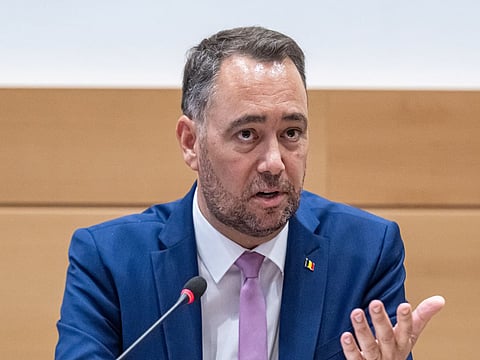Belgium to join nations recognising Palestine at UN, sanction Israel over Gaza
Brussels ties recognition to Hamas conditions, unveils 12 sanctions on Israel over Gaza

Dubai: Belgium will join the growing list of countries preparing to recognise the State of Palestine at this month’s United Nations General Assembly, while also imposing sweeping sanctions on Israel over its war in Gaza, Foreign Minister Maxime Prévot announced overnight.
Prévot said recognition would be formalised once Hamas frees all remaining hostages from the October 7, 2023 attacks and “no longer has any role in managing Palestine.”
“Palestine will be recognised by Belgium at the UN session! And firm sanctions will be imposed against the Israeli government,” he wrote on X.
The Palestinian Foreign Ministry welcomed Belgium’s pledge, calling it consistent with UN resolutions and protective of the two-state solution. It urged other states to follow suit “to stop genocide, displacement, starvation, and annexation.”
Alongside the recognition pledge, Belgium unveiled 12 sanctions targeting Israel’s settlement enterprise and far-right leadership.
These include a ban on imports from illegal settlements, a review of public procurement policies with Israeli companies, restrictions on consular assistance to Belgians living in settlements, and travel bans on extremist ministers Itamar Ben-Gvir and Bezalel Smotrich, several violent settlers and Hamas leaders.
“This is not about sanctioning the Israeli people but about ensuring that their government respects international and humanitarian law,” Prévot said.
Human rights obligations
He also voiced support for the EU to suspend its association agreement with Israel, arguing that breaches of human rights obligations should carry consequences.
The Belgian government has faced weeks of turmoil over the policy. Prévot’s centrist Les Engagés party threatened to block government business if coalition partners resisted tougher action against Israel.
Also Read: America must recognise Palestine
Prime Minister Bart De Wever of the Flemish nationalist party insisted recognition be linked to strict conditions. The compromise reflects domestic pressure and growing international momentum for Palestinian recognition.
France announced in July it would recognise Palestine at the UNGA and is co-hosting a meeting on the issue with Saudi Arabia on September 22. More than a dozen Western nations, including Australia, Canada and the UK, have signalled similar moves, though most attach conditions related to Hamas’s dismantling. Currently, 147 of the UN’s 193 members already recognise Palestinian statehood.
Israel has strongly criticised the wave of recognitions. Prime Minister Benjamin Netanyahu has argued the move “rewards Hamas’s monstrous terrorism & punishes its victims.” Avigdor Lieberman, leader of Israel’s opposition Yisrael Beiteinu party, said Belgium’s decision was “another direct result of Netanyahu’s political failure.” Smotrich has threatened to establish new illegal settlements for every country that recognises Palestine.
The United States is also pushing back. Secretary of State Marco Rubio denounced France’s recognition plan as “reckless” and said it only fuels Hamas propaganda. Washington will deny and revoke visas for Palestinian officials attending the UNGA.
Belgium’s announcement comes as Gaza faces worsening conditions. A UN-backed monitor has declared famine in the north and warned it could spread across the enclave by late September.
Since October 7, Israel’s offensive has killed at least 63,459 Palestinians and wounded more than 160,000, according to local health authorities. Israel launched its campaign after Hamas’s attack that left 1,200 Israelis dead and 250 taken hostage.
In July, Belgian prosecutors referred a war crimes complaint against two Israeli soldiers to the International Criminal Court, underscoring Brussels’ willingness to pursue accountability.
Prévot said Belgium would also intensify its fight against antisemitism by mobilising security services and involving Jewish community leaders, insisting the new sanctions were aimed at Israel’s government, not its people.
For Belgium, the decision signals a dramatic escalation in its stance. Whether more European nations follow its lead in New York could determine the scale of pressure Israel faces in the months ahead — and whether recognition of Palestine moves from symbolic declaration to a concrete step toward a two-state solution.
Sign up for the Daily Briefing
Get the latest news and updates straight to your inbox



